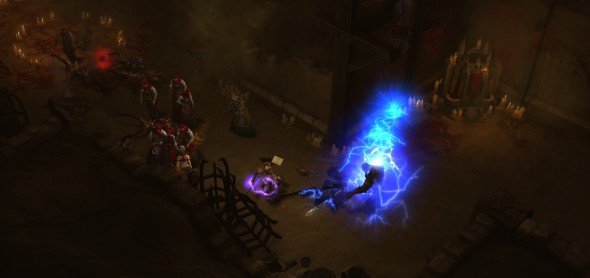Diablo III interview—What diehard Diablo II fans can expect from D3
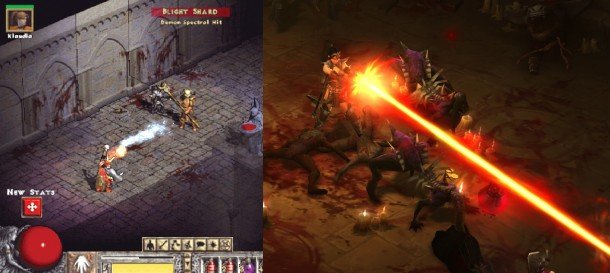
Change can be hard. When Diablo III's aesthetic direction was first revealed, parts of the Diablo II community erupted with complaints, claiming that the graphics weren't in the true spirit of the Diablo series. But what about the gameplay itself? As a hardcore D2 player, with plenty of alts, gear, and Stone of Jordans stashed away in the bank, I wanted to know what Diablo III would offer to players who consider themselves intimately familiar with D2's mechanics. We asked D3's senior technical game designer Wyatt Cheng and senior game designer Andrew Chambers about what parallels we could expect from the next installment. We were surprised by what's actually making it into the game, and it's great getting insight into Blizzard's viewpoint on hardcore gamers.
PC Gamer: Did anything the players were doing in the beta surprise you? Did some guy just run around and kill stumps for an hour?
Wyatt Cheng: Some of the Skeleton King trips were pretty fast. We knew that the first time you kill the Skeleton King, you get a yellow item, and we're not concerned, in the big picture, because later on you'll be able to get yellow items from just about anywhere. But it definitely became the predominate way to try and farm (yellow) items. I think I saw somebody do a giant killstreak on the Jar of Souls event to get a huge XP bonus. He kited all the monsters from the entire dungeon into the Jar of Souls room, then started the JoS event and killed all the monsters from the level AND the JoS to get a huge killstreak bonus. That was pretty ridiculous.
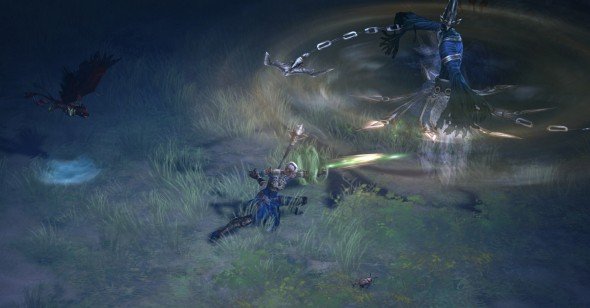
PC Gamer: Can you guys tell us a little more about the Inferno difficulty level? Is it just going to be flat-out mean to the player?
WC: Yes. We have Normal, Nightmare, and Hell, and one thing about Hell in Diablo 2, it was more geared towards characters from, I'm gonna say, level 60-65 up to 100. Our level cap is 60, and Inferno is really geared towards max-level characters. One of the things we've been talking about is, we have a lot of environment art. And we feel that the most fun way to play isn't to do the same run over and over and over and over again within the same environment, background art, whatever. So Inferno is the entire game on a much tighter level (band?? 3:30) so that you can basically do your loot farming in a wider variety of places. It's still the same game, but everything's designed for level 60, and the rewards are (superior) across the board.
Andrew Chambers: And yeah, it's really, really mean. It's brutal.
PC Gamer: For someone who hasn't played D1 or D2, how long will it take for them to get to a point where they can survive Inferno?
Keep up to date with the most important stories and the best deals, as picked by the PC Gamer team.
AC: They'll be able to survive that, they'll be able to get in and play it. When I say "mean," it's like hard, it's good for the hardcore. That's what we want. A brand new player to Diablo...the best thing about the game is that they played through normal, and that introduces them to all the game systems. Then they go through the different difficulty levels, and by the time they reach Inferno, they're pretty much are hardcore players. So then they're all ready for it, and they're fully capable of enjoying that harder content.
WC: Two things I've learned about high end players. The first is that anyone can someday become a hardcore, dedicated player. I mean, look at World of Warcraft. You have some people who have never played a game before in their life. And they pick up World of Warcraft, they get into its easy leveling, and someone teaches them about UI or mods, or key customization or what have you. Two years later, they're speedrunning Heroic Epic Halls or something. Fast forward another two years and they're in some top 100 guild. They would never even play before. I think that's the beauty of Blizzard games: we really try to make our games accessible, and I think sometimes distinguishing between casual and hardcore is a little too much of a "one or the other" distinction; it's really about making a game accessible but then allowing everyone to transition eventually.
The second thing I've learned about hardcore players is that the really best players find ways to squeeze out the craziest advantages that they possibly can. So how long will it take them to do Inferno? It's really hard to say.
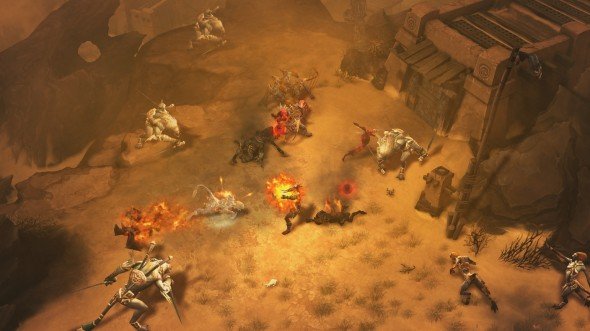
PCG: What will the requirements be to unlocking Inferno, and how many people will you need to be able to take it on?
WC: You have to be level 60, and you have to have finished the game on Hell. There's a pretty good chance that you're going to be undergeared for Inferno if you jump in right away, so it's a soft requirement, but you're probably going to have to farm gear for a little while in Hell [difficulty]. But Inferno is soloable; we believe that is a core component of Diablo: the ability for someone to play by themselves, or play with their friends.
PCG: What can you guys tell us about randomized events? How do those work?
WC: On a technical level, we have regions in the world where we can swap out what was there before; usually it's just like a boring field that's empty, and we can swap in a special events. The main goal from a design perspective is to surprise the player. The feeling of a grind or the feeling that a game is tedious is alleviated somewhat by surprise and randomness. Some of the events are very common, like the Jar of Souls, and some of the events are [really rare.] There's all sorts of things we can do with random: we can do a mini-event, for example there's the equivalent of fighting some monsters that spawn in, like Jar of Souls. We can [also] do random vendors.
AC: Yeah. A lot of the time, you'll play through the game, and say, in Normal you won't see any vendors out in the world, but when you hit Nightmare and you're playing through all of a sudden you might run into the Miner or something. You go into a cave, and he's down there, and for some reason he's down there looking for something. So you actually escort him through. You might've seen the same cave in Normal difficulty, but he wasn't there. So for your second play through, it feels like the world is alive and growing. That's one of the best things about random events--it gives this world some sense of aliveness to it. It feels like it's different whenever you're interacting with it. You could get to Inferno and still not have seen an event yet, and so you run into for it the first time, and that's pretty awesome.
PCG: So are the rewards for events more valuable than those dropped by bosses and tougher enemies?
WC: I don't think any events are quite like that. Honestly, our design goal is that players enjoy traveling through the world, hunting out champion and rare monsters [in relation to end-game, level 60 content]. I think the champion/rare monsters provide the most longevity, in terms of replayability; then while you're doing that, if you happen to come across a random event, great.
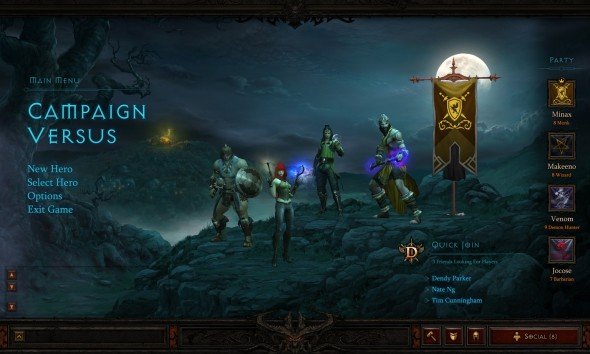
PCG: Will hardcore players get anything extra for their dedication, like different loot or titles?
WC: Not loot or stats. There are cosmetic rewards—we have a banner system in Diablo III, which is a visual representation of your accomplishments that's shown in the Battle.net screen, or anytime you create a party with your friends. They're customizable, and some customization options will be unlocked through Hardcore achievements.
PCG: Now, in Diablo II, power-leveling your friends or making alts and getting them power-leveled was a huge part of the game. Are you guys trying to promote that, or push people away from that?
WC: Twinking, as it's colloquially called, is important. I think it's actually really fun. It's something that we intentionally try to support. I think that the trick is to make the twinking experience as fun as possible. So, for example, one phrase I like to use around the office a lot is, "players are very good at finding the path of least resistance." So if I'm going to level a new character, I'm going to find the fastest and most optimal way to do it. Our job, as developers, is not to stop you from leveling your character fast. Our job is to make the path of least resistance is also the most fun. So, for example, is it fun to stack up a whole bunch of +Experience Gain gear that I've collected over time, put that on, and level, y'know, maybe 50% faster than the first time? Yes, we do think that's fun, so let's support that. We have a lot of features that actually encourage a second character. Things like your shared stash; also, a lot of people noticed in the beta that your gold is shared across all of your character.
AC: Your Artisan's as well—your crafters are account-wide. So if you level up your Blacksmith to level 10, when you start on your next character, he'll still be level 10, letting you focus on one of the other artisans.
PCG: In Diablo II, magic find was really important. Is that also going to be crucial to finding the best items in Diablo III?
WC: There's been some back and forth on magic find in the community. On the developer side, we feel that magic find is something that, as a stat, players want. And that's really important, because when there aren't a number of stats pulling you in different directions, then the item game becomes a lot less interesting. So if I went out and said, "Hey, you know what? The only stat you want (let's say, hypothetically) is movement speed." Then all of a sudden, my items become a lot less interesting, because I quickly look for movement speed and reject everything else. The problem with magic find in Diablo 2 is that, for certain classes (particularly the Sorceress), she really didn't care about enough stats—she just really cared about plus to skills, and magic find.
And the problem manifested itself; people just put on lots of magic find and that was all they cared about. There's a lot more tension in Diablo III, and a lot more stats that you care about. We re-did the attribute system to be based around Attack, Precision, Vitality, and Defense, because we felt that these are stats that all the characters will care about. When you have a lot of different trade-offs to make, then magic find becomes yet another stat that you're trying to optimize against everything else, and the interesting item game is there once again.
